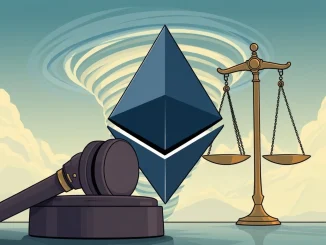
A significant development is underway in Pakistan that could reshape the landscape for cryptocurrencies and blockchain technology. The nation is taking a decisive step towards embracing digital assets, not through an outright ban, but through structured regulation. This move is particularly interesting for anyone watching the evolution of global Pakistan crypto regulation.
What is the Digital Assets Authority Pakistan?
The Ministry of Finance in Pakistan has officially sanctioned the establishment of the Digital Assets Authority Pakistan (PDAA). This new entity is set to become the central body overseeing the burgeoning sector of blockchain-based financial infrastructure within the country.
The PDAA’s mandate is broad and ambitious. Its primary goal is to bring clarity and structure to an area that has often operated in a legal gray zone. Key areas of oversight include:
- Licensing requirements for digital asset service providers.
- Regulation of cryptocurrency exchanges operating within or serving Pakistani residents.
- Supervision of custodians and wallet providers handling digital assets.
- Establishing rules for stablecoins.
This comprehensive approach signals a shift from caution to controlled adoption, aiming to harness the potential of digital assets while mitigating associated risks.
Beyond Regulation: Fostering Pakistan Blockchain Innovation
The PDAA isn’t just about imposing rules; it’s also tasked with actively promoting the growth and development of the sector. The authority will be a key player in advancing several strategic initiatives aimed at leveraging blockchain technology for national benefit. This dual role of regulator and facilitator is crucial for fostering Pakistan blockchain innovation.
Specific initiatives the PDAA will push forward include:
- Tokenization of National Assets and Public Debt: Exploring how blockchain can be used to represent ownership of state assets or manage public debt, potentially increasing transparency and efficiency.
- Monetization of Surplus Electricity via Regulated Bitcoin Mining: A particularly innovative approach. By regulating Bitcoin mining operations, Pakistan plans to utilize its excess electricity supply, turning a potential waste product into revenue. This highlights the unique economic opportunities being considered, specifically concerning Regulated Bitcoin Mining Pakistan.
- Blockchain Development Support for Startups: Providing a supportive environment, potentially including regulatory sandboxes or guidance, for new businesses building on blockchain technology.
These initiatives demonstrate a forward-thinking perspective, looking to integrate blockchain and digital assets into the national economy in meaningful ways.
Why is This Step Significant for Digital Assets Pakistan?
The creation of the PDAA marks a pivotal moment for Digital Assets Pakistan. For years, the legal status of cryptocurrencies and related technologies has been uncertain, leading to hesitation from both businesses and individuals. A clear regulatory framework provided by a dedicated authority offers several potential benefits:
- Increased Confidence: A regulated environment can attract both domestic and international investment by providing legal certainty and consumer protection.
- Reduced Risk: Oversight of exchanges and custodians can help prevent fraud and illicit activities, making the ecosystem safer for users.
- Economic Growth: By supporting startups and exploring innovative uses like asset tokenization and regulated mining, Pakistan aims to unlock new avenues for economic development and job creation.
- Integration into the Financial System: Regulating digital assets is the first step towards potentially integrating them into the broader financial system, offering new tools for payments, finance, and investment.
What Are the Potential Challenges Ahead?
While the establishment of the PDAA is a positive step, the path forward is not without challenges. Implementing effective regulation requires significant expertise and resources. Key challenges may include:
- Developing clear, effective, and adaptable regulations in a rapidly evolving space.
- Ensuring compliance and enforcement across a decentralized technology.
- Educating the public and businesses about the new framework.
- Balancing innovation support with necessary consumer protection and financial stability concerns.
- Addressing potential international coordination issues regarding digital asset flows.
Looking Ahead: The Future of Digital Assets in Pakistan
Pakistan’s decision to establish the Digital Assets Authority signals a clear intent to move beyond uncertainty and build a structured environment for cryptocurrencies and blockchain. This move positions Pakistan among a growing number of nations seeking to actively manage and benefit from the digital asset revolution rather than simply ignore or ban it. The success of the PDAA will depend on its ability to effectively implement its mandate, foster innovation responsibly, and adapt to the dynamic nature of the digital asset space. It’s a bold step that warrants close observation from the global crypto community.



